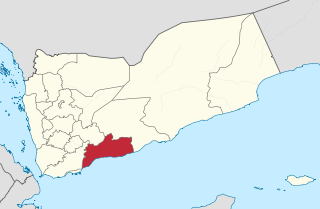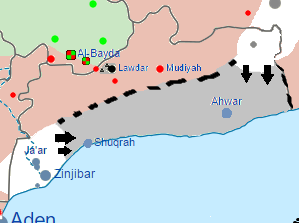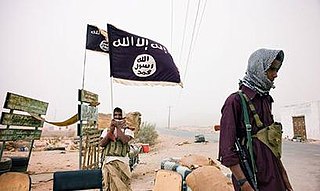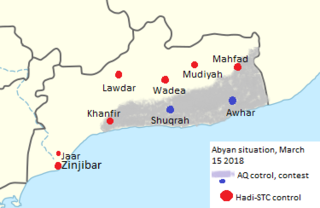In its war on terrorism in Yemen, the US government describes Yemen as "an important partner in the global war on terrorism". There have been attacks on civilian targets and tourists, and there was a cargo-plane bomb plot in 2010. Counter-terrorism operations have been conducted by the Yemeni police, the Yemeni military, and the United States Armed Forces.

Abyan is a governorate of Yemen. The Abyan region was historically part of the Fadhli Sultanate. It was a base to the Aden-Abyan Islamic Army militant group. Its capital is the city of Zinjibar. This governorate is noted for its agriculture, in particular the cultivation of date palms and animal husbandry.

Al-Qaeda in the Arabian Peninsula, abbreviated as AQAP, also known as Ansar al-Sharia in Yemen, is a Sunni Islamist insurgent extremist group, which is part of the al-Qaeda network and primarily active in Yemen and Saudi Arabia. It is considered the most active of al-Qaeda's branches that emerged after the weakening of central leadership.

Qasim Yahya Mahdi al-Raymi was a Yemeni militant who was the emir of al-Qaeda in the Arabian Peninsula (AQAP). Al-Raymi was one of 23 men who escaped in the 3 February 2006 prison-break in Yemen, along with other notable al-Qaeda members. Al-Raymi was connected to a July 2007 suicide bombing that killed eight Spanish tourists. In 2009, the Yemeni government accused him of being responsible for the running of an al-Qaeda training camp in Abyan province. After serving as AQAP's military commander, al-Raymi was promoted to leader after the death of Nasir al-Wuhayshi on 12 June 2015.

The South Yemen insurgency is a term used by the Yemeni government to describe the protests and attacks on government forces in southern Yemen, ongoing since 27 April 2009. Although the violence has been blamed on elements within the southern secessionist movement, leaders of the group maintain that their aims of independence are to be achieved through peaceful means, and claim that attacks are from ordinary citizens in response to the government's provocative actions. The insurgency comes amid the Shia insurgency in the country's north as led by the Houthi communities. Southern leaders led a brief, unsuccessful secession in 1994 following unification. Many of them are involved in the present secession movement. Southern separatist insurgents are active mainly in the area of former South Yemen, but also in Ad Dali' Governorate, which was not a part of the independent southern state. They are supported by the United Arab Emirates, even though the UAE is a member of the Saudi Arabian-led coalition working to support the Yemeni government.

The Al-Qaeda insurgency in Yemen is an ongoing armed conflict between the Yemeni government, the United States and their allies, and al-Qaeda-affiliated cells in Yemen. It is a part of the Global War on Terror.

The Southern Movement, sometimes known as the Southern Separatist Movement, or South Yemen Movement, or Aden Movement, and colloquially known as al-Hirak, is a political movement and paramilitary organization active in the south of Yemen since 2007, demanding secession from the Republic of Yemen and a return to the former independent state of South Yemen. At present, its best-known political offshoot, the Southern Transitional Council led by Aidarus al-Zoubaidi, is the de facto leadership across many provinces of the south.
The Battle of Zinjibar was a battle between forces loyal to Yemeni leader Ali Abdullah Saleh and Islamist militant forces, possibly including elements of al-Qaeda in the Arabian Peninsula (AQAP), for control of the town of Zinjibar and its surroundings as part of the wider insurgency in the self-declared Al-Qaeda Emirate in Yemen. Many of the Islamist forces operating in Abyan province refer to themselves as Ansar al-Sharia.

The 2012 Abyan offensive was an offensive by the Yemeni military against Islamist militant forces, possibly including elements of Al-Qaeda in the Arabian Peninsula (AQAP), in the province of Abyan with the purpose of re-capturing the militant-held towns of Zinjibar and Jaʿār.
The following lists events that happened during 2014 in Yemen.
The following lists events that happened during 2012 in Yemen.

United States drone strikes in Yemen started after the September 11, 2001 attacks in the United States, when the US military attacked the Islamist militant presence in Yemen, in particular Al-Qaeda in the Arabian Peninsula using drone warfare.
In early December 2015, two Yemeni towns, Zinjibar and Ja'ar, were captured by the jihadist group Al-Qaeda in the Arabian Peninsula (AQAP). This was the second capture and occupation of Zinjibar during unrest in Yemen. The town was earlier taken by AQAP's in May 2011 and held until the summer of 2012.

The Southern Abyan Offensive refers to a 2016 offensive that AQAP launched in late February, which ended with a victory for AQAP as Yemeni tribal fighters loyal to president Abdrabbuh Mansur Hadi were driven out of the Abyan Governorate.

The Shabwah Governorate offensive is an insurgent campaign by Al-Qaeda in the Arabian Peninsula (AQAP) forces to take control of Shabwah Governorate during the Yemeni Civil War.
The Second Battle of Mukalla refers to an armed conflict between al-Qaeda in the Arabian Peninsula (AQAP) and the Saudi-led Coalition. The aim of the coalition offensive was to disable the newly resurgent al-Qaeda Emirate in Yemen by recapturing its capital, Mukalla. The battle led to a coalition victory, in which the coalition forces gained control of Mukalla and the surrounding coastal areas.
The following is a timeline of the Yemeni civil war, which began in September 2014.
Usayd al-Adani was a senior leader of Al-Qaeda in the Arabian Peninsula.

The Abyan conflict was a series of clashes between forces of AQAP loyal to Yemeni president Abdrabbuh Mansur Hadi, and forces loyal to Southern Movement for the control of Abyan between 2016 and 2018.

In August 2022, forces of Yemen's Emirati-backed separatist Southern Movement, mainly represented by the Southern Transitional Council, launched an offensive in the Abyan and Shabwah provinces. Initially, the Southern forces mostly fought against Saudi-backed government forces, most of which belonged to the armed wing of the Islah party. Since early September 2022, however, the Southern Movement's offensive has become more focused on battling local al-Qaeda strongholds.










